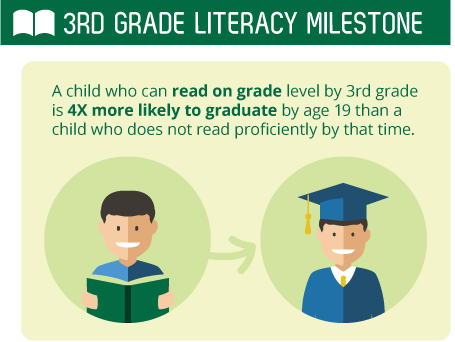Third-grade Literacy’s Enormous Impact on Life
Third-grade literacy has an enormous impact on a child’s life. Research indicates that third grade is a critical turning point for students. A child who can read on grade level by third grade is four times more likely to graduate by age 19 than a child who does not read proficiently by that time.
In Delaware, as many as 46 percent of third graders are not proficient in reading and a deeper look at the data reveals low-income, English learner, and special education populations are even more likely to miss this critical milestone.
There is work underway to improve student outcomes in early literacy. The Delaware State Board of Education is engaged in a Literacy Campaign and the state, with leadership from United Way and the State Board, has joined the Annie E. Casey Foundation’s Literacy Campaign. Further, the Student Success 2025 Progress Report identifies early learning as a short-term priority and recommends adopting policies to increase reading by the third grade such as strengthening teacher training and preparation, literacy screenings and interventions.
This month, you can take action to shape Delaware’s state plan to implement the Every Student Succeeds Act (ESSA). The Campaign for Grade-Level Reading has developed a State ESSA Implementation Planning Grade-Level Reading Policy Priority Check-list that highlights specific policy recommendations that early learning advocates can prioritize in state ESSA Plans. The Delaware Department of Education will present the draft plan to the State Board on March 16 and is planning to submit it to U.S. Department of Education on April 3.
And if you’re interested in learning more about early literacy, here’s a short list of resources on policies and programs to increase the number of kids who reach the critical third grade literacy milestone, such as:
- High-quality early learning and expanded Pre-K. According to the National Institute for Early Education Research (NIEER), the state of Delaware ranks 33rd on access to state-funded pre-k.
- Family outreach and health supports that decrease chronic absenteeism
- High quality summer programs (like the Summer Collaborative) that decrease summer learning loss
